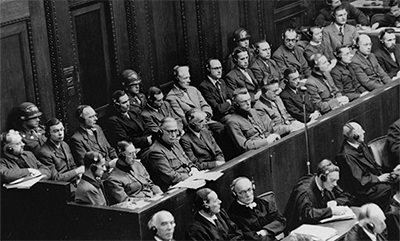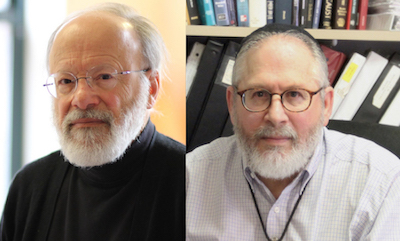Professors Mark 70 Years since Nuremberg Doctors Trial.
 George Annas and Michael Grodin, professors in the Center for Health Law, Ethics & Human Rights, are the co-editors of a special section of the January 2018 issue of the American Journal of Public Health marking the 70th anniversary of the Nuremberg Doctors Trial.
George Annas and Michael Grodin, professors in the Center for Health Law, Ethics & Human Rights, are the co-editors of a special section of the January 2018 issue of the American Journal of Public Health marking the 70th anniversary of the Nuremberg Doctors Trial.
The articles in the special section reflect on the Nazi doctors’ trial, which ran from December 1946 through August 1947, and the trial’s relevance today.
“The Doctors Trial was more than just ‘a mere murder trial,” Annas and Grodin wrote in an introduction to the special section. “Its purpose was also, in the words of chief prosecutor General Telford Taylor, to ‘cut out and expose’ the ‘ideas and motives which moved these [physicians] to treat their fellow men as less than beasts’ so that they do not ‘become a spreading cancer in the breast of humanity.’”
The resulting Nuremberg Code was “designed to prevent future abuse of research subjects in much more usual nonwar circumstances, and … is the most important legacy of the Doctors’ Trial,” they wrote.

Between them, Annas and Grodin have spent 25 years researching the topic. Annas’ essay in the special section reflects on the Nuremberg Code’s requirement of voluntary, competent, informed, and understanding consent of any human subject in an experiment, and its influence on US law. Grodin’s essay situates the trial in the context of the Nazi ideology of racial hygiene, and argues that the Nazis’ practices continue to provide valuable lessons about the dangers inherent in contemporary practices.
The section also includes an essay by Sondra Crosby, associate professor of health law, policy & management, and Gilbert Benavidez (SPH’17), a researcher in the center. The essay examines the similarities between the atrocities revealed by the trial and the use of US medical professionals in torture during the War on Terror. “On the 70th anniversary of the Doctors Trial,” Crosby and Benavidez concluded, “basic provisions of international human rights law, including the prohibition on torture, are well worth reemphasizing.”